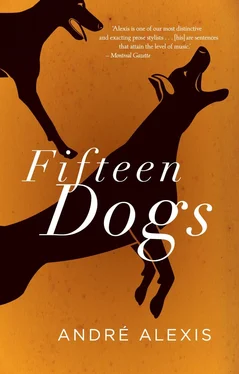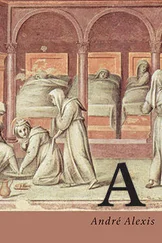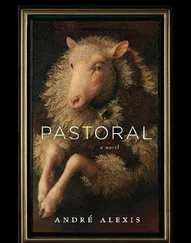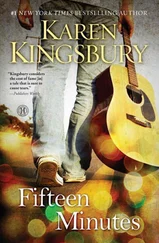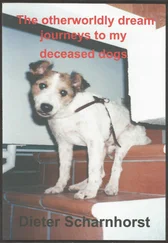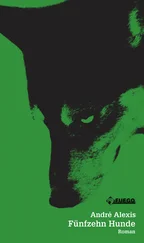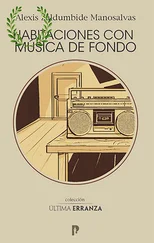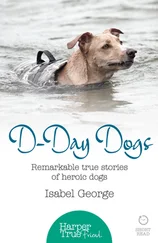It was dark, though the moon fell out of its pocket of clouds from time to time. Four in the morning, the world full of shadows. The gates to the Canadian National Exhibition loomed as if they might totter and crush anything beneath them. There were not many cars, but Majnoun waited for the green light at the bottom of the street. Half of the pack — Rosie, Athena, Benjy, an Albertan mutt named Prince and a Duck Toller called Bobbie — waited with him. The other half — Frick, Frack, Dougie, Bella the Great Dane, and a mutt named Max — blithely crossed the boulevard with Atticus.
Once they had all crossed, the dark and shushing lake lay before them, while along the promenade lay various types of dung, various bits of food, and other things to be sniffed out. Atticus, a crumpled-face dog whose instinct was to hunt, could also feel the presence of small animals, rats and mice most likely, and he wanted to go after them. He exhorted the others to hunt with him.
— Why? asked Majnoun.
The question — asked with an innovation of the dogs’ common language — was stunning. Atticus had never considered that it might be right to hold himself back from rats, birds or food. He considered the ‘why?’ distractedly licking his snout as he did. Finally, innovating in language himself, he said
— Why not?
Frick and Frack, delighted, immediately agreed.
— Why not? they asked. Why not?
— Where will we hide if a master comes? answered Majnoun.
A more subtle question no dog could have asked. The assumptions behind it felt both right and yet strangely wrong. Majnoun, though he respected his own master, assumed the dogs would all want to hide from their masters. Freedom, thought Majnoun, came before respect. But the word master evoked in all of them feelings that did and did not call for hiding. For some, the idea of a master was comforting. Prince, who since coming to the city had been separated from Kim, his master, would have done anything to find him. Athena, all three and a half pounds of her, was used to being carried wherever she went. She was exhausted already, having kept up with the pack for such a long stretch. Faced with all the walking they would have to do, faced with the uncertainty that now seemed to be their lot, she thought she would happily submit to one who fed her and carried her about. However, as most of the other, bigger dogs seemed to dislike the idea of submission, she pretended to dislike it as well.
Even Majnoun’s position was not without subtlety or ambivalence. He had always been proud of his ability to do what his master asked. He had earned the biscuits and treats that had come to him, but he had resented the ritual, too. He had sometimes had to suppress himself to keep from running away. In fact, he would have fled his master, had he been able to take the treats with him — not just the treats, mind you, but the whole feeling of treats, the being patted, the being spoken to in the way his master spoke when pleased. Of course, now that he was free, there was no use thinking about treats at all.
Frick and Frack, both too immature to have fully understood or experienced the pleasures of servitude, were the only ones entirely in agreement with Majnoun’s suggestion that they would need a hiding place at the appearance of a master.
Atticus, whose feelings were as nuanced as Majnoun’s, nevertheless said
— Why hide? Don’t we have teeth?
He bared his teeth and all understood the terrible suggestion.
— I couldn’t bite my mistress, said Athena. She would not be pleased.
— I do not know what to say, said Atticus.
— The small bitch is not wrong, said Majnoun. If we were to bite masters, other masters would notice us and resent our freedom. I have seen many free dogs beaten. We should not bite unless we are attacked. And we should find shelter.
— All this talking, said Atticus. It is not like dogs to talk so much. We’ll find food. Then we’ll look for shelter.
They went hunting. That is, some went in search of what they knew as food and others went after the animals they atavistically associated with sustenance. They were tremendously successful. Their instincts led them infallibly to the small animals — four rats, five squirrels — that they killed with ingenious efficiency, corralling or ambushing the poor creatures. After two hours, as the morning sun lit the land and turned the lake bluish green, there were rats, squirrels, hot dog buns, bits of hamburger, handfuls of French fries, half-eaten apples, and sugary confections so covered in dirt it was difficult to say what they had been. The only real disappointment was that they had not managed to catch any geese. Also: most of the dogs resisted the small animals and went for the scraps of human food. They left the headless, half-chewed remains of rats and squirrels in a neat row on the hill beside the Boulevard Club.
In the days that followed, there were a number of signs — both subtle and obvious — that their newfound thoughtfulness had led to collective change. To begin with, a new language flowered within them, changing the way they communicated. This change was especially evident in Prince. He was constantly finding words within himself, words he shared with the others. It was Prince, for instance, who came up with the word for ‘human’ (roughly: grrr-ahhi , the sound of a growl followed a sound typical of humans). This was a significant accomplishment, as the dogs could now speak of the primates without speaking of mastery. It was also Prince who devised what might be called the dogs’ first witticism: the word for ‘bone’ in the new language (roughly: rrr-eye ) and the word for ‘stone’ (roughly: rrr-eeye ) were very close. When Prince was asked one evening what he was eating, he replied ‘stone’ while indicating a bone. A number of the dogs found this — the first conspicuous pun in the language — both diverting and right, suggesting as it did that the bones in question were difficult to chew.
Then, too, they became sharper hunters and more discriminating scavengers as they became intimate with their territory: Parkdale and High Park, from Bloor to the lake, from Windemere to Strachan. All quickly learned the places where they could congregate without attracting undue human — or canine — attention. Moreover: spurred by Prince’s observations of sunlight and shadow, they learned to segment the day into useful units. That is, collectively, they discovered a use for time, which discovery was salve for their awareness of its passing. (Day, from the first appearance of sun to the first moment of its descent, was broken into eight unequal units, each of which was given a name. Night, from the first quieting of the world to the first noisy birds, was broken into eleven. In this way, the dogs’ day was made up of nineteen units, rather than twenty-four.)
It was, in part, this new relationship to time and place that influenced the creation of their den. Atticus, practical and persuasive (though he mistrusted the new language from the beginning), suggested they take over a coppice in High Park, a clearing beneath a cluster of evergreens, to which they brought tennis balls, running shoes, human clothing, blankets, squeaky toys … anything they could find or steal to make the place more hospitable. They did not intend to stay in the coppice forever. It was, Atticus said, makeshift and temporary, a place to meet at the start of night, but it soon began to feel as if it were theirs. It smelled of pine gum, dog and urine.
Perhaps the most striking sign that ‘primate thinking’ could be useful, however, was in the relationship between Bella and Athena. The two were, of course, at opposite ends of the scale where weight and height were concerned. They were the same age — that is, three — but Athena was all of three or four pounds and her legs were short. She could not keep up with the others when the pack moved. Bella was three or four feet tall and weighed somewhere around two hundred pounds. She did not often run. Rather, though she wasn’t the most thoughtful of dogs, she moved with something like deliberation, majestically. Seeing Athena could not keep up with them and remembering how a four-year-old girl had ridden on her back, Bella offered to let Athena ride.
Читать дальше
